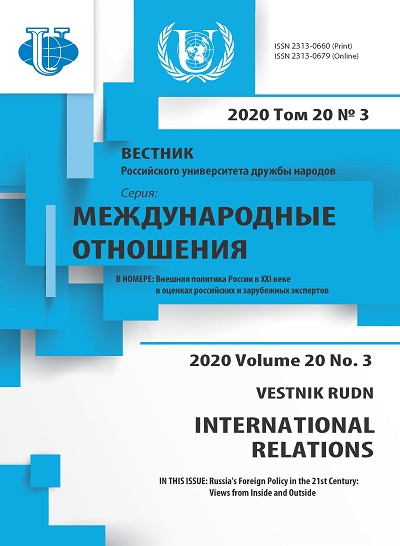Russophobia in the Obama Era Foreign Policy Discourse (2009-2017)
- Authors: Roberts K.1
-
Affiliations:
- Mount Royal University
- Issue: Vol 20, No 3 (2020): Russia’s Foreign Policy in the 21st Century: Views from Inside and Outside
- Pages: 476-490
- Section: THEMATIC DOSSIER
- URL: https://journals.rudn.ru/international-relations/article/view/24622
- DOI: https://doi.org/10.22363/2313-0660-2020-20-3-476-490
Cite item
Full Text
Abstract
Anti-Russian sentiment - what some call “Russophobia” - is subtle, but visible in the American foreign policy discourse since the end of the Cold War. Most recently, it can be found in the Obama-era discourse about Russia, despite the positive bump in relations after the so-called “reset” of 2009. This paper contends that, among the many irritants in Russia - U.S. relations, anti-Russian sentiment among the American foreign policy leadership is an understudied phenomenon. Russophobia matters because it is present even at times of promise in the relationship; it impedes striking a “normal” relationship with Russia, and it influences policy decisions. This paper conceptualizes Russophobia, considers the source of its persistence in the American foreign policy discourse, and identifies examples of anti-Russian sentiment among key members of Barack Obama’s foreign policy team through an examination of memoirs and personal reflections about Russia. The paper asserts that anti-Russian attitudes in the American foreign policy discourse throughout the post-Cold War era must be identified and understood in order to gain a better understanding of why forging stronger, mutually beneficial relations with Russia continues to evade American policy makers. Anti-Russian sentiment undermined the Obama - Medvedev reset and, while it is certainly not alone responsible for deteriorating relations with Russia, it helped to perpetuate the downturn in relations and must be identified and better understood. The arguments made in this paper and in the selected citations herein, are based upon non-partisan scholarly inquiry and are not a consequence of the author’s personal or political views.
About the authors
Kari Roberts
Mount Royal University
Email: kroberts@mtroyal.ca
Associate Professor and Department Chair, the Department of Economics, Justice, and Policy Studies Calgary, Canada
References
- Benn, D.W. (2014). On Re-examining Western Attitudes to Russia. International Affairs, 90 (6), 1319-1328. doi: 10.1111/1468-2346.12172
- Campbell, D. (1992). Writing Security: United States Foreign Policy and the Politics of Identity. Minneapolis: University of Minnesota Press.
- Dijkink, G. (1996). National Identity and Geopolitical Visions: Maps of Pride and Pain. New York: Routledge.
- Feklyunina, V. (2013). Constructing Russophobia. In: Ray, T. (Eds.). Russia’s Identity in International Relations: Images, Perceptions, Misperceptions. London: Routledge. P. 91-109.
- Gilmore, J. (2014). The Uncertain Merger of Values and Interests in UK Foreign Policy. International Affairs, 90 (3), 23-41. doi: 10.1057/9781137392350_2
- Gleason, J. (1971). The Genesis of Russophobia in Great Britain. Octagon Books.
- Hansen, L. & Waever, O. (Eds.). (2002). European Integration and National Identity: The Challenge of the Nordic States. London: Routledge.
- Jervis, R. (1976). Perception and Misperception in International Politics. Princeton, NJ: Princeton University Press.
- Lieven, A. (2000). Against Russophobia. World Policy Journal, 17 (4), 25-32. doi: 10.1215/07402775-2001-1004
- Lofflmann, G. (2015). Leading from Behind: American Exceptionalism and President Obama’s post-American Vision of Hegemony. Geopolitics, 20 (2), 308-332. doi: 10.1080/14650045.2015.1017633
- Luostarinen, H. (1989). Finnish Russophobia: The Story of an Enemy Image. Journal of Peace Research, 26 (2), 123-137. doi: 10.1177/0022343389026002002
- Nasr, V. (2013). The Indispensable Nation: American Foreign Policy in Retreat. New York: Doubleday.
- Pouliot, V. (2010). International Security in Practice: The Politics of NATO - Russia Diplomacy. Cambridge: Cambridge University Press.
- Sakwa, R. (2012). The Cold Peace: Making Sense of Russia’s Relationship with the West. In: Kanet R.E. & Freire M.R. (Eds.). Russia and European Security. Dordrecht: True Republic of Letters Publishing. P. 21-44
- Sakwa, R. (2015). The Death of Europe? Continental Fates after Ukraine. International Affairs, 91 (3), 553-579. doi: 10.1111/1468-2346.12281
- Sakwa, R. (2017). Russia against the Rest: The Post-Cold War Crisis of World Order. Cambridge: Cambridge University Press
- Stent, A. (2014). The Limits of Partnership: U.S.-Russian Relations in the Twenty-First Century. Princeton, NJ: Princeton University Press
- Tatum, D.S. (2018). Discourse, Genealogy and Methods of Text Selection in International Relations. Cambridge Review of International Affairs, 31 (3-4), 344-364. doi: 10.1080/09557571.2018.1518971
- Tsygankov, A.P. (2009a). Blaming Moscow: The Power of the Anti-Russia Lobby. Global Dialogue, 11, 64-73.
- Tsygankov, A.P. (2009b). Russophobia: Anti-Russian Lobby and American Foreign Policy. New York, NY: Palgrave MacMillan.
- Weldes, J. (1996). Constructing National Interest. European Journal of International Relations, 2 (3), 275-318. doi: 10.1177/1354066196002003001











